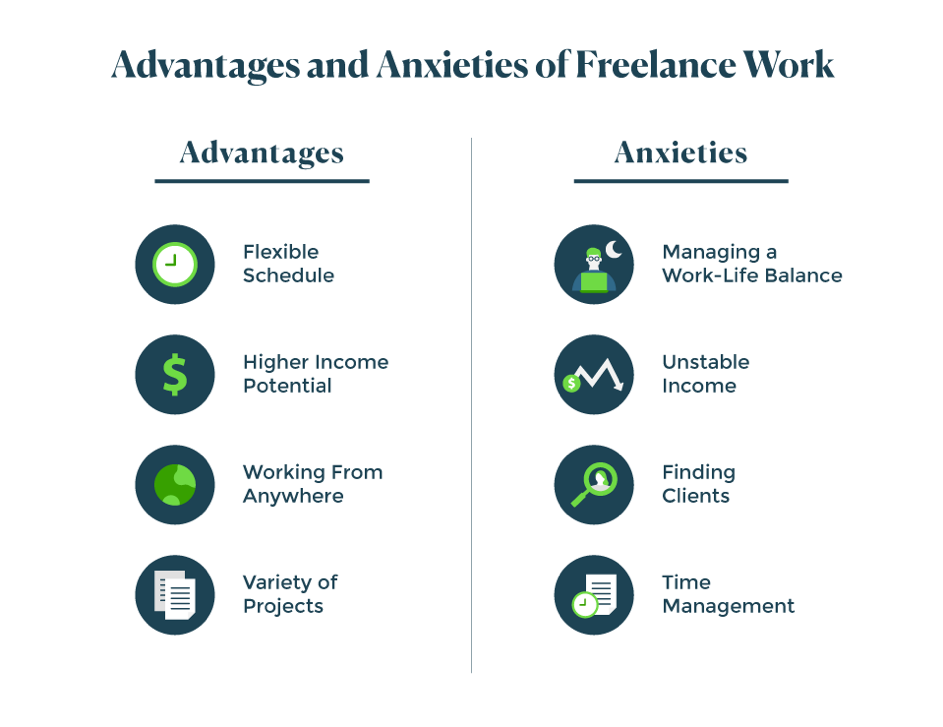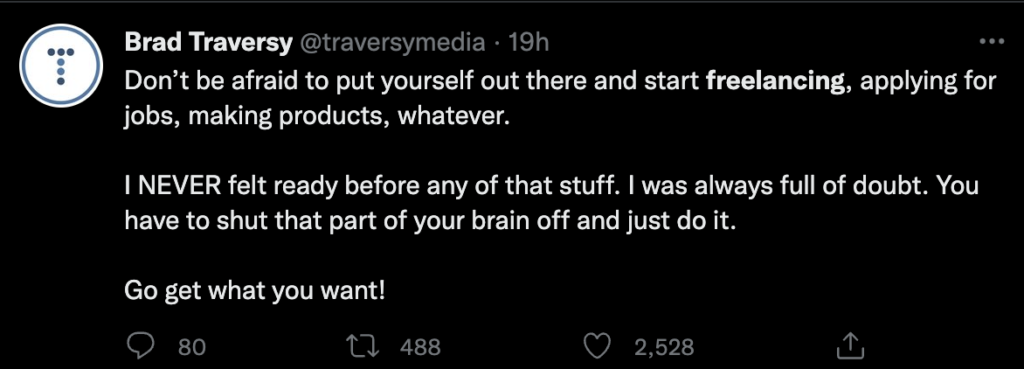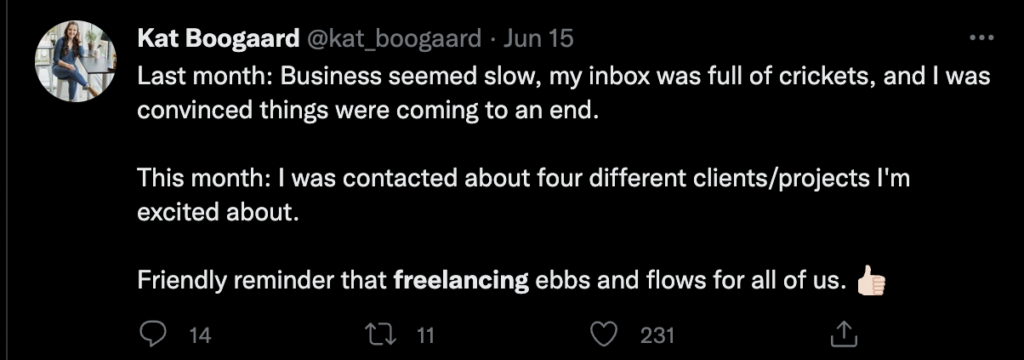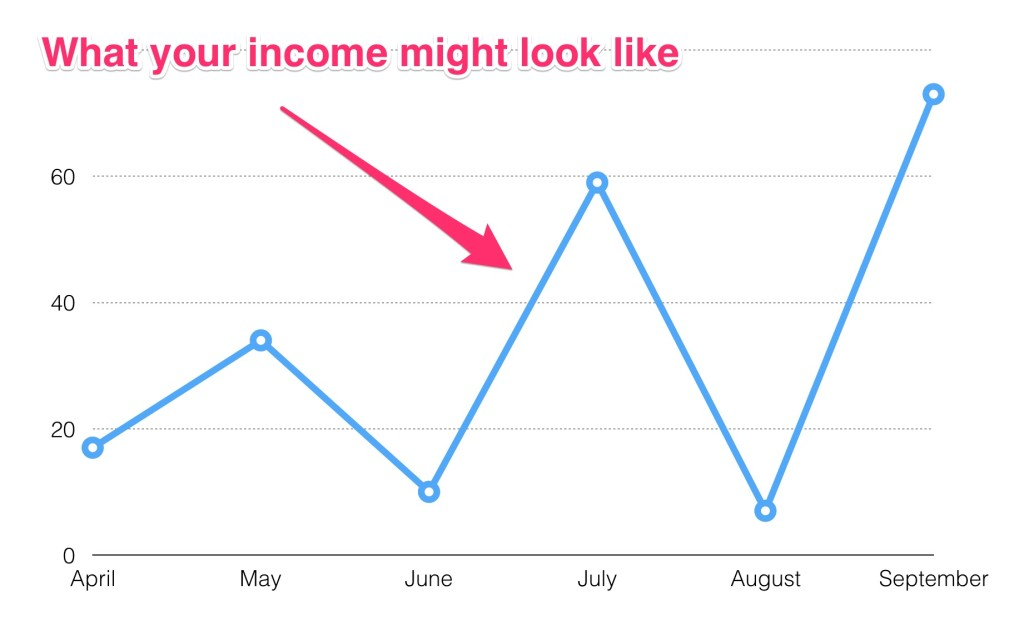
A report titled “Freelancing in America” by Upwork stated that 56.7 million Americans freelanced in 2018. And this was up by 3.7 million people from 2014. That states that more than one in three people are freelancing. In fact, this number will rise higher with the younger generation leaning more towards freelancing jobs.
It’s clear with these numbers that freelancing is here to stay. Most of us with full-time jobs often consider taking up freelancing jobs. As advantageous as it is, it also comes with a set of disadvantages. So, let’s discuss the pros and cons of freelancing more in detail.

5 Pros of Freelancing
1. Freedom of choice
One of the best advantages of freelancing is the freedom of choosing the work for yourself. In freelancing, one is free to select the client, project, company, or the kind of service one wants to deliver as per their suitability. Unlike a corporate job, freelancing doesn’t hold you to work on undesirable projects with disliked clients.

2. Flexibility of work
A freelancer works according to their schedule. They are free from any restriction of the rigid nine to five job. They can work whenever and however they want to deliver the project on time. The clients just need the allotted project to be submitted in time and don’t care about the work or time a freelancer puts in to complete the job, unlike corporate styles.
3. Workload control
Freelancers have the advantage of controlling their workload. They are free to take as much work as they want, based on their competency, capability, and availability. Freelancers can also work with a team of other freelancers and delegate work to respective experts in the team.
4. Independence
Freelancers are independent beings. They are not bound by any employer’s limitations, terms, or conditions for a long-term basis. They are also free to use their creativity, without any hindrance from the employers, unlike the corporate jobs.

5. Varied exposure
Unlike corporate jobs, freelancing provides the advantage of extreme exposure to working with different clients simultaneously.
5 Cons of Freelancing
1. Sole responsibility for work
As a freelancer, one is solely responsible for all the work on a project. So, the success or failure of the project lies solely on the freelancer’s shoulders. Also, unlike in a corporate job, there is no one to guide or share different ideas for the project, making it difficult to make decisions alone.
2. Sporadic work pattern

The continuous workflow is one of the main disadvantages of freelancing. Freelancers have to strive hard in the starting or even forever to get the following projects after completing the previous ones. Often, clients may ask to work on a project and then shelf it for unknown reasons. There may be long gaps too between different projects.
3. Lack of employee benefits
Another disadvantage of freelancing is the lack of employee benefits that one receives in their corporate job like provident fund, paid leaves, regular income, celebrations, gifts, appraisals, appreciations, bonuses, etc.
4. Isolation
Freelancers become isolated as they no longer spend their days working with their colleagues. They work alone with no teammates. This is a disadvantage for those who are social and don’t like to work alone all time. Also, lack of communication with peers causes stress and boredom too.

5. Lack of resources
As freelancers work alone, they have to work on their own. There are no available resources like computers, data, meetings on projects, discussions on strategies, etc., which one gets in a corporate job.
Conclusion
These are obviously both advantages and disadvantages of freelancing. Think about taking up freelancing as a career after understanding each of them.
If you are a creative risk-taker and are not in any financial crisis, freelancing is the best for you. On the other hand, freelancing is not recommended for you if you are financially unstable, as it might not provide a fixed income regularly unless you reach a certain stage in your freelance career. Choose what suits you the best.
FAQs
No. You can work both if you can manage two types of jobs simultaneously. There are no terms for being a freelancer. This is one of the pros of freelancing.
Freelancing is a great career if you are a risk-taker. You can earn better than a job in most cases, while sometimes, you may not. However, the regularity of income can be a question in freelancing.
Many websites provide projects to freelancers. You just have to sign up as a freelancer, fill in your details and start away. Pepper Content is a great website for freelance writers, translators, and graphic designers.
Some websites offer a fixed charge to pay, while you will have to bid for the projects directly to the clients on some websites.
Latest Blogs
Explore how Google’s 2025 AI search updates triggered ranking chaos. Learn actionable strategies to adapt your SEO for AI Overviews, zero-click searches, and SERP volatility. Stay ahead now.
Learn how to rank on AI search engines like ChatGPT, Perplexity, and Gemini by optimizing your content for authority, structure, and relevance. Stay ahead in AI-driven search with this strategic guide.
Explore the best healthcare SEO services for your medical practice. Improve online visibility and effectively reach more patients in need of your services.
Get your hands on the latest news!
Similar Posts

Freelancing 101
5 mins read
11 Resources For Designers to Find Freelance Jobs Online

Freelancing 101
6 mins read
30 Freelance Industry Statistics to Get You Started

Freelancing 101
5 mins read